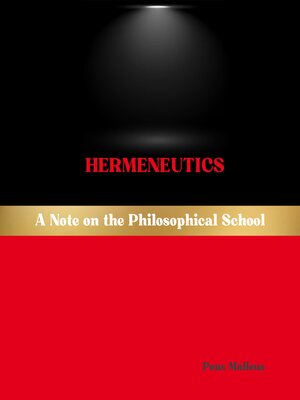Hermeneutics
audiobook (Unabridged) ∣ A Note on the Philosophical School · Western Philosophical Schools
By Pons Malleus

Sign up to save your library
With an OverDrive account, you can save your favorite libraries for at-a-glance information about availability. Find out more about OverDrive accounts.
Find this title in Libby, the library reading app by OverDrive.



Search for a digital library with this title
Title found at these libraries:
| Library Name | Distance |
|---|---|
| Loading... |
This audiobook is narrated by a digital voice.
Hermeneutics, at its heart, is the art and science of interpretation—an intellectual tradition that stretches from the ancient world to the present day, weaving through theology, law, literature, and philosophy. What began as a method for interpreting sacred texts gradually evolved into a profound philosophical inquiry into the very nature of understanding. This audiobook is an invitation into that journey: a journey toward comprehending not only what texts mean, but how meaning itself emerges through the interaction between the interpreter and the interpreted.
The philosophical school of hermeneutics is not a monolithic doctrine but a constellation of thinkers, questions, and evolving perspectives. From the early exegetical practices of biblical scholars and the legal commentaries of Roman jurists, to the modern reflections of Schleiermacher, Dilthey, Heidegger, Gadamer, Ricoeur, and others, hermeneutics has continually redefined itself in dialogue with the crises and complexities of each era. It is a discipline that does not promise absolute answers but cultivates a patient attentiveness to ambiguity, context, and historical situatedness.
This audiobook does not aim to be a comprehensive chronology or an exhaustive account of every contributor to the hermeneutic tradition. Rather, it is a philosophical exploration of how hermeneutics transforms our understanding of language, history, human experience, and the self. It is an attempt to make visible the underlying structures of interpretation that often remain implicit in our everyday encounters with texts, traditions, and one another.
At its most radical, hermeneutics asks us to rethink the very possibility of objective knowledge. What does it mean to understand something or someone? Can meaning ever be separated from the interpreter's own historical and cultural context? What role do preconceptions play in shaping our interpretations?







